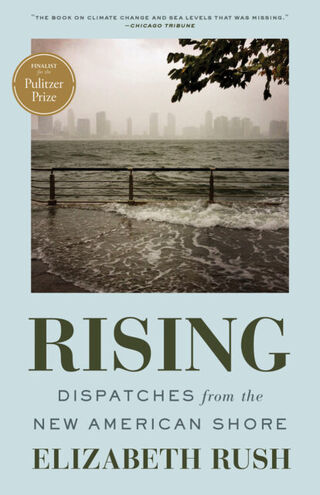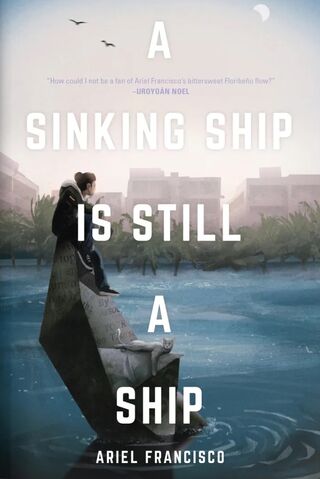Environment
Coping with Climate Change Through Literature
Can literature help us figure out how to live with a changing planet?
Posted October 25, 2021 Reviewed by Tyler Woods
When I think about rising sea levels, my body braces. My impulse is to dissociate, to dwell in denial. What can I do? What's the point of thinking about climate change if I'm helpless to do anything more than recycle, travel less, curtail my carbon footprint as much (or as little) as modern life allows?
I can listen to the news, but that gets me as far as helplessness. Then I wondered about reading? I'm a reader, a writer. Literature is where I turn to help figure out life's complexities.
And, you know what? I think it's working. That's partly because I turned to a variety of writing dealing with climate change in different styles and genres. Read side-by-side, two very different books stand out: Elizabeth Rush's nonfiction Rising: Dispatches from the American Shore and Ariel Francisco's poetry collection A Sinking Ship Is Still a Ship. As Rush writes, "I believe that language can lessen the distance between humans and the world of which we are a part." In fact, research in psychology suggests more than a few reasons that literature may be a cultural force that helps us both cope and take action in the face of climate change.
Rush writes, "I think about how the disappearance of whole neighborhoods is already disarranging our mental maps of who we are and where we come from." Our sense of self is bound up with place, so when our environments are under threat, so are we. Francisco suggests a similar idea, if in a more darkly fanciful way, in a poem entitled, "Imagining Miami Beach Underwater": "Ocean Drive lives up to its name, . . . / Famed art deco replaced by fire coral / and colorful parrrotfish, neon lights / restored by pulsating swarms of moon / jellyfish, lit up like a Saturday night." If Rush's book is sobering, Francisco's is disorienting. The psychological research on climate change suggests that we need multi-faceted ways of coping with situation whose implications multiply beyond our emotional or cognitive abilities to process.
As early as 2010, the American Psychological Association published a report on "Psychology and Global Climate Change," addressing the "multi-faceted phenomenon." The report suggests that the psychological impacts of climate change are "profound." That's no surprise, but the details of the report are interesting, and definitely address some of my own anxieties. For example:
- "Long-term climate change," the report offers, "is not easily detected by personal experience, yet...invites personal observation and evaluation." A perceived threat that isn't concrete is a source of anxiety (though it must be said that the threat is becoming steadily more concrete for more people).
- Heat, extreme weather, a scarcity of resources, and the exacerbation of existing inequalities, the report continues, are likely to add stress to interpersonal relationships.
- General uncertainty, the mistrust of experts, and feelings of helplessness are "barriers" that "limit climate change action."
Addressed to psychologists, the report asks, "How can psychologists assist in limiting climate change?" The answer: More research, new behavior models, more empirical analysis that may provide "missing pieces" in discussions of climate change that don't address psychology. All of that is important, but I want to suggest that literature may play a role in alleviating anxiety and encouraging action precisely because it offers readers antidotes to the problems identified by psychologists. Literary examinations of climate change make its impacts concrete, provide multi-faceted portrayals of people as they cope with climate change, and becomes a vehicle for addressing thoughts and feelings that may otherwise remain menacingly vague.

In Rising, Elizabeth Rush writes as a science journalist, documenting the facts as they stand. Francisco writes as an elegiac escapee from South Florida, witnessing the sinking of coastal life, human and otherwise. Both books deliver bracing observations in lyrical language.
As I read Rising (a Pulitizer nominee), I learned some facts:
- Historically, sea rise tends to happen rapidly, not gradually.
- It's salt, not just water, that is transforming ecosystems along coasts.
- The human population of South Florida had been about six thousand; now it's more than six million.
- The Roseate Spoonbills are disappearing from South Florida coasts because they feed in shallow waters that are increasingly rare.
- Government organizations like the Army Corps of Engineers and FEMA will pay for the relocation of coastal communities threatened by rising sea levels—if enough residents agree to it.
- When a mostly white community in Staten Island agrees to relocate, they receive bonuses on pre-hurricane property values and may use the money to move to a place they choose; when a Biloxi-Chitimacha-Choctaw community on Louisiana's disappearing Isle de Jean Charles agrees to relocate, they are required to do so en-masse, to houses built by the government in a specified location.
- Rufous Hummingbirds travel 5,000 miles each year, from the Gulf Coast to the Pacific Northwest, where their breeding places are disappearing. Spotted owls in Oregon, like many species, are moving a little bit northward every year, seeking the "thermal niche" that allows for their survival.
- Salt marsh restoration projects in northern California and Florida's Everglades are beginning to enable the earth to absorb rising tides that would otherwise cause severe flooding.

The facts I learn from Rush are bracing—not exactly consoling. But I can work with them. I can think with them. I can feel with them. Since my twenties, therapists have told me I'll feel better if I face my fears. It's not advice I take easily, or quickly. But when I do, I find that living with discomfiting realities beats vaguely imagined catastrophes.
Because Rush is a literary journalist, reading her prose involves taking on her philosophical disposition, one that combines the urgency of the moment with a long view of natural history, human and otherwise. She reminds me, repeatedly, that humans have not always inhabited this planet. When dinosaurs did, the planet was significantly warmer, and sea levels were higher than they are now. The planet changes. There's no stopping that. But what we must do is reconsider how human interventions do the changing. Will we continue to erode salt marshes or restore them? Protect hummingbirds' nesting grounds or destroy them?

Francisco, the poet, deals in facts too, though not nearly as many. He documents the flood that landed an octopus in a parking garage, reminds us that Hurricane Matthew spared Miami, but ravaged St. Augustine. For him, facts are vehicles for feeling. After all, we are humans. Our actions and feelings guide each other. We need to practice calibrating our actions and our feelings in order to live with the mess we've made.
A Sinking Ship Is Still a Ship explores the possibilities of feeling our way through climate change in two languages: English and Spanish, on facing pages. He does it in a voice that's vernacular and lyric, approachable in its heightened depictions of a sinking city. In his poems, horror and humor commingle. "Miami will be underwater in forty or fifty years," he tells his mother in one poem. Her reply: "that's fine. I'll be dead by then." In another, entitled "Don't Ever Come to Florida," he recounts the state's famous deaths: Poncé de Leon, Bob Marley, Jack Kerouac, Hart Crane, Anna Nicole Smith.
In a poem entitled "Morning After Hurricane Irma," he writes, "The clouds have excavated northward, / The trees lay in pieces across / the parking lot—like men / torn limb from limb by some great cyclops—save for / the palms, which over time have learned how to lean in lean in even the strongest winds."

Rush's book is about humans learning to lean, to face, and to live with a warming earth, its tides rising upon us. That's why reading these two books together is so illuminating. In very different registers, they explore what it means for all of us to live with our unstable climates and our rising seas. As dark as it can be, Francisco's book documents one man's attempt to lean like the palms too. "When the waves reach my / home, I'll make a raft of the door."
In 2020, one of the APA report's authors, Susan Clayton (co-author of the book, Psychology and Climate Change, with Christie Manning), published her research on climate anxiety in The Journal of Anxiety Disorders. In it, she points out that some of our anxiety is adaptive, appropriate to the dire situation we face—a version of learning to lean. But not all of it.
"Heat," she observes, "has been consistently associated with aggression and conflict." I can't help but think of the many heated exchanges between government officials and citizens of coastal communities Rush documents in Rising. Climate change, Clayton observes, is a social problem, one whose psychological consequences are unlikely to be alleviated "in the absence of societal, or even global, attention to the issue."
Writers like Rush and Francisco are providing vehicles for that attention—nuanced ones that provide opportunities for exploring our fears and anxieties, for making connections between our experiences and those of others. They validate and expand our experience. Surely, there is psychological and social value in that.
Reading won't solve climate change. But it can help us lean into the future we have no choice but to face.




